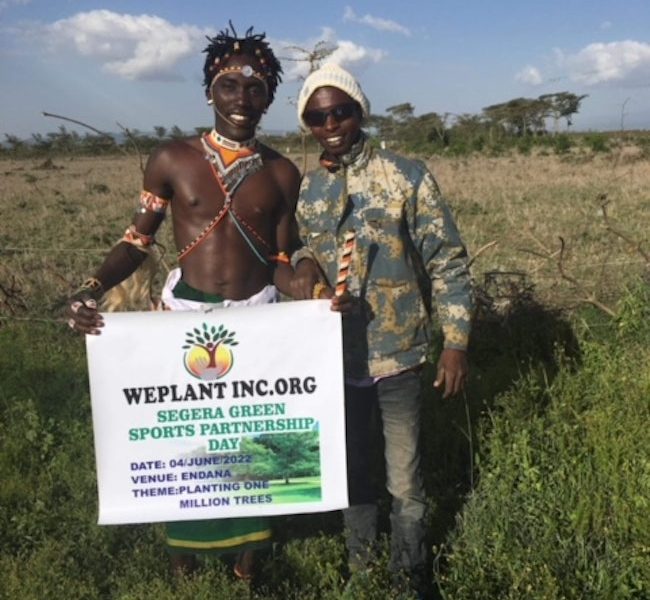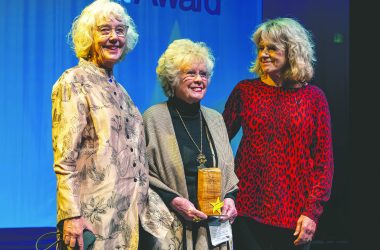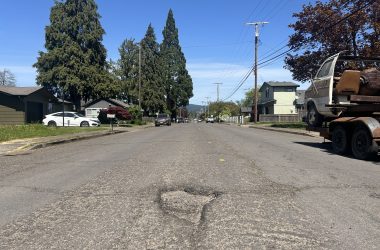 WePlantInc Green Ambassadors at Arbor Day tree giveaway in Endana, Kenya.
WePlantInc Green Ambassadors at Arbor Day tree giveaway in Endana, Kenya.
DANA MERRYDAY, COTTAGE GROVE
Sometimes good ideas happen through serendipitous meetings in exotic places. WePlant Inc, an international Non-Governmental Organization (NGO), based in Cottage Grove is just such a story. This nonprofit, whose status is akin to other NGOs, such as The International Red Cross, Doctors without Borders, or Greenpeace, is dedicated to saving the planet one tree at a time.
Case in point was a chance meeting deep in the mountains of Mexico. Debra Bartlett, founder and director of the 501(c)3 “WePlant Inc,” has had a years-long connection with this region and has made annual visits there for decades. In 2012 she was on a two-week retreat when in conversation, she made a connection that served as the seed for what has grown into a mission to help blunt the effects of climate change through something as simple as planting trees, millions of them.
The first encounter in Mexico was not the end of the story. There were other stops along the way, Morocco, and ultimately Kenya, where WePlant Inc has really taken root.
Bartlett’s connections made and stories heard in Mexico compelled her to make a trip to Kenya in 2014. Her experiences there were so transformational because of what she found there was so shocking. The indigenous people there had virtually nothing. No water, no shoes, rudimentary medical care through the Segera Mission, and most critically, from Bartlett’s standpoint, very few trees remaining.
Bartlett made immediate connections with the Samburu, Maasai, Borano, Turkana people who live in this semi-arid section of central Kenya. The tribes have moved from hunting/gathering into a semi-nomadic lifestyle herding their animals, they have clung to many of their traditional ways. The Samburu are closely related to the Maasai, separated only by location, and speak essentially the same language. They are also, naturally, one of the most friendly tribes in Eastern Africa.
To better understand the conditions the Tribes face it is necessary to understand a bit of how they have traditionally lived. Money was not really viewed as important in tribal society. They were fully dependent on their animals for food and materials. Wealth is measured in livestock, cattle, sheep, camels, and goats. To feed their herds in the dry country where they live, the people cut trees to feed their stock. Elephants and other native mammals also need to eat and with the resulting overgrazing from domestic animals, the wild critters also turn to trees as a source of sustenance.
Trees are an important fuel source for the native population. Traditionally, meals are cooked in an open firepit kitchen in the home. The need for fuel has stripped many trees of their branches and ultimately their trunks are turned into charcoal for both local use and as an export product.
In an already arid area suffering from drought and climate change, this excessive grazing and harvesting of trees is leading to desertification of vast areas of formerly forested lands in Kenya.
Being invited to Kenya and learning first-hand of these conditions pushed Bartlett to make a commitment to do something to help the Samburu people as well as the planet. As she pondered what she had learned from experiencing conditions directly, an idea reverberated over and over with her, sinking deeper and deeper into her consciousness. We, we, we … and as the vision crystalized as “We Plant,” which emerged as a mantra for the movement.
Another realization that bubbled up was that all paths forward went through education. So teaching and learning were a part of the equation of WePlant from the earliest inklings of the emerging movement.
Annual trips to learn and assist the local people that had become endeared to Bartlett’s heart followed. One way she could assist was bringing traditional beaded craftwork to see here at home and sending the proceeds back to the people.
Covid made her activities and travel difficult if not impossible for a time, but as things eased up she was able to resume her in-person connections.
In 2019 a major agreement with the Chandaria Foundation in partnership with the Global Peace Foundation led to a modern net house tree nursery in Endana. Among the listed goals are training young people in tree growing innovations, and empowering and sensitization of indigenous communities in environmental conservation and sustainability. Dr. Manu Chandaria, Chairman of the foundation, emphasized the need to engage communities and schools and promote a culture of volunteerism with the target of working toward a goal of 10% forest cover.
Education again. Another partner in the tree planting effort in Kenya has been Dr. Jane Goodall’s “Roots & Shoots” program. There are many interrelated opportunities that education and support from WePlant Inc have aided in making inroads in improving life around the world.
The traditional open hearth cooking over wood fires indoors entails the unintentional near continuous breathing of wood smoke by women that leads to a number of respiratory illnesses. WePlant is working to help deliver the technology of simple Jiko stoves at no cost to the people without any means of paying and for around $50 to those who can afford to pay. These highly efficient stoves will allow the people to burn the plentiful dung from their herd animals as well as that of elephants. Not only will this save lung health but also trees in a multiple win scenario from a very modest investment.
Another avenue WePlant has ventured into had direct ties to the education of young women in Samburu County. Traditionally, lack of sanitary napkins has caused young women to stay home during their flow day, falling behind on their lessons and in many cases ending their schooling, opting to become young mothers. Supporting a “dignity kit” program was added to WePlant’s mission in the region.
Empowering youth to grow, plant, and tend trees will also address other issues that affect young people, idle youth with little more outlook than menial jobs or none at all. The cutting of trees and turning them into charcoal for export has been tied to these conditions.
It all comes back to trees, especially when it comes to blunting the effects of climate change, trees are in the frontlines of blunting the effects of a drier, hotter, planet.
WePlant Inc is actively setting up chapters in other countries and regions.
Think globally, act locally. While focusing some part of every day on keeping in touch with what is happening in Kenya and working to make things run smoothly, Bartlett has not neglected her adopted city. Naturally being tree-centric, she noticed an announcement of a vacancy on the City of Cottage Grove’s Urban Forestry Committee. She applied and was appointed and now Bartlett had an outlet for her tree dreams locally.
While appreciating the depth, expertise, and commitment of the committee, in reading the responsibilities and scope of the committee she noted the lack in the past of the Urban Forestry Committee to apply for grants to promote tree health improvement for the City’s urban forest. She encouraged the committee to apply for the Arbor Day Foundation grant that ultimately provided the bulk of the funding for the Arbor Day Tree giveaway that saw over 800 trees added to the city’s tree canopy. The goal there is to hit at least 28% tree canopy. I am sure that we will hear more from this local group in the near future.
Whether halfway round the world or right here in the Grove, WePlant Inc has the same goal, according to Bartlett. “Millions of trees will shade and moderate temperatures in our communities. We are dedicated to environmental support by providing education and trees required to build our canopies, one tree by one.”
We plant!
Email: [email protected]








